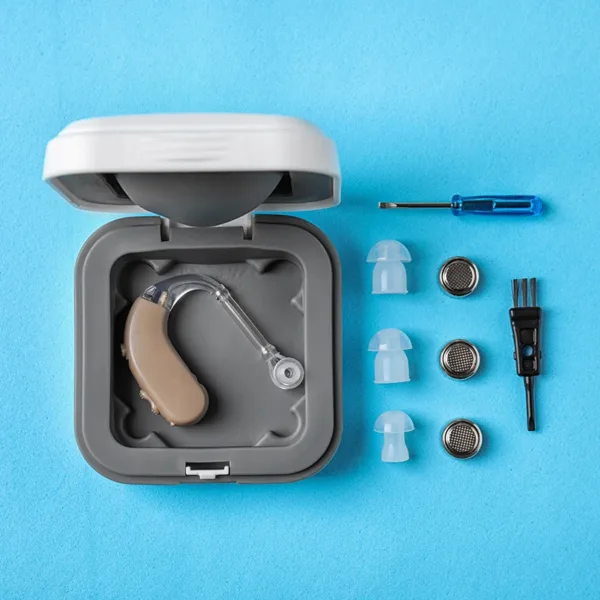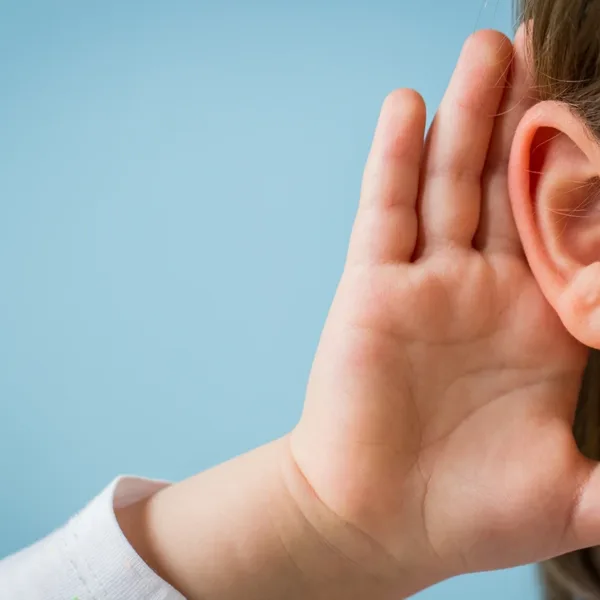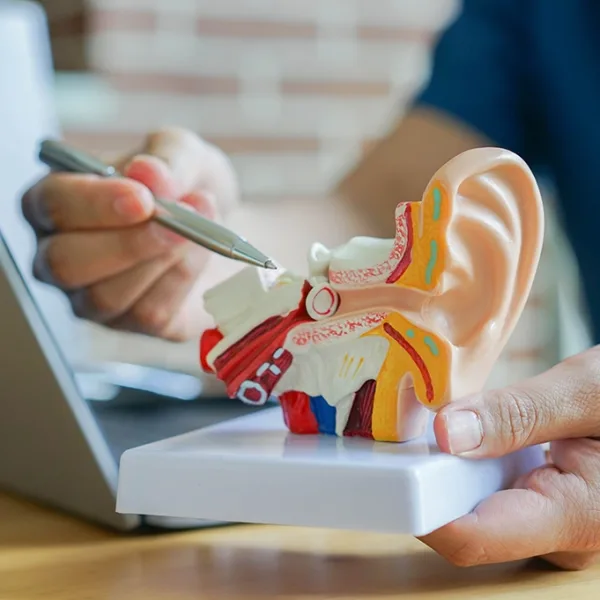
Hearing loss is a common problem, which affects millions of people worldwide. It can be caused by a variety of factors, some of which include age, noise exposure, and certain medical complications. If you are experiencing symptoms of hearing loss, it is important to take action as soon as possible. In this article, we will discuss what you should do if you think you’re losing your hearing, including steps you can take to address the issue and improve your quality of life.
You’ll also learn about the symptoms of hearing loss, how to get a preliminary, online hearing test, and when you should get a comprehensive hearing test in a clinic setting. Whether or not you are experiencing loss right now, it’s a good idea to know how you can help prevent hearing loss. We’ll show you how you can do that, too.
Signs and Symptoms of Hearing Loss
Most often people notice a gradual change in the quality of their hearing as they get older, or as a result of Noise Induced Hearing Loss (NIHL). If you have noticed any of the following symptoms, then you may, indeed, be experiencing some hearing loss:
- Difficulty understanding conversations in loud or crowded environments
- Missing words and asking people to repeat themselves more often
- Trouble hearing on the phone
- Needing higher volume on tv, stereo, etc.
- Having to concentrate harder to hear clearly
- Not hearing sounds that others near you report hearing
- Finding it harder to hear women and children
- Struggling to hear certain consonants such as S, H or F
Hearing Loss Simulator
If you have a loved one who has difficulty hearing, it can be hard to understand what they are experiencing. Simply plugging your ears will never fully recreate hearing loss symptoms, as the condition is far more complex. With our Hearing Loss Simulator, you can find out what hearing loss sounds like and get a better idea of what they are experiencing.
Sudden Changes in Hearing
If you experience sudden, or drastic changes in your hearing, or complete hearing loss in one or both ears, it’s important to seek medical help immediately. Sudden sensorineural hearing loss (SSHL), also known as sudden deafness, is when you lose 30 decibels or more of your hearing suddenly or over the course of a few days. The cause is often unknown, but there are conditions for which it can be a symptom, such as:
- Autoimmune Diseases
- Circulation Problems
- Ototoxic Medications
- Multiple Sclerosis
Aside from the suddenness of the loss, this type of hearing loss is unique in that 90 percent of those who experience SSHL only have one ear that is affected. Plus, unlike NIHL, which is permanent, SSHL has the potential to be medically treated, but only if you seek medical attention immediately—there is a critical window of time in which SSHL has the most potential to be treated. Outside of that critical window, it is likely the sudden loss will be permanent.
What to Do if You Think You Have Hearing Loss
The first step to taking control of your hearing health is getting your hearing tested prior to, or at the onset of symptoms. If you think that you are losing your hearing, it can be a worrying and isolating experience. It’s not uncommon to feel embarrassed or even ashamed to seek help, but ignoring the problem will only make it worse. Fortunately, there are many steps you can take to manage hearing loss and prevent it from impacting your daily life.
Take a Hearing Test
The first place to start, when you’re experiencing hearing loss, is to have your hearing checked. While most forms of hearing loss are permanent, the sooner you identify the problem, the sooner you can get treatment. Untreated hearing loss can result in feelings of embarrassment, frustration, anxiety, isolation, and depression, so it’s important to address it as soon as possible.
Online Hearing Test
Taking an online hearing test can provide a brief and general assessment of potential changes in your hearing. However, self-guided hearing tests should only be used as a preliminary step before scheduling a hearing test with a specialist. These tests are not conducted in a sound booth with specialized equipment; therefore, they are only an indicator that something may be wrong, not an actual diagnosis.
Professional Hearing Health Exam
A hearing health exam will determine if you have a hearing loss, as well as the type, its cause, and the level of severity. Your hearing health specialist will also be able to assess the overall health of your ears. The steps involved in diagnosing hearing loss include:
- Health Questionnaire
- Physical Examination
- Hearing Measurement
Prioritizing your hearing health is important at any age. Getting an initial baseline ear health assessment, while your hearing is healthy and stable, can help you track and measure any changes more accurately.
Since the most common forms of hearing loss are age-related, it is recommended that individuals who are 60 years old or older have routine hearing health exams on an annual basis. Adults under 41 are advised to have a hearing health exam every three to five years, even if symptom-free. For those between 41 and 60, every two years will suffice, unless you experience any changes to your hearing. Individuals who work in noisy environments should get their hearing checked more frequently, regardless of age.
Practice Preventative Care
While everyone loses some hearing capacity as they grow older, there are several types of hearing loss that can be prevented. Taking some simple precautions can go a long way to preserving your hearing health and quality of life.
Preventing Noise Induced Hearing Loss
Noise Induced Hearing Loss (NIHL) is a result of unprotected exposure to loud noise, typically for prolonged periods of time, or due to a single defining event. Here are a few ways you can protect your hearing around loud noises:
- Wear properly fitted hearing protection when warranted
- Limit exposure to loud environments, and give your ears breaks
- Keep your music volume, or other audio entertainment, at a safe listening level
- Close your vehicle’s windows when in traffic or in loud areas
- To avoid NIHL in the workplace, use barriers around the source or between you and the source
Preventing Trauma-Induced Hearing Loss
Accidents happen. While you can’t predict and prevent all of them, there are a few ways to lower your risk of severe inner ear trauma and hearing loss, including:
- Wear protective headgear when warranted
- Seek medical attention after any impact to the head
- Never put anything in your ear canal, not even to clean them with a cotton swab
- See a doctor if congestion in your ear canal is severe or prolonged
- Avoid pressure buildup in your eardrum at high altitudes by chewing gum, wearing special earplugs, or yawning
Preventing Medication-induced Hearing Loss
Ototoxic medications are typically prescription drugs that inadvertently affect your hearing. The effects of medication-induced hearing loss (Ototoxicity) are usually permanent, but if it is detected early enough, it is possible to prevent further damage.
If you notice any of the following symptoms, while taking a new medication, let your doctor know right away:
- Ringing, humming, buzzing, or roaring in your ears (Tinnitus)
- Problems with balance
- Difficulty hearing high-pitched sounds
- Problems focusing on specific sounds amidst too much background noise
- Noticeable hearing loss in one or both ears
Find a Hearing Health Care Specialist Now
Hearing loss can have a significant impact on your quality of life, if left untreated. The first step in managing your hearing health is to get your hearing tested. With an accurate diagnosis, you can find the best treatment, and support you need to regain control of your hearing and continue to enjoy the sounds of your life. If you think that you may be losing your hearing or have experienced any changes in your quality of hearing, we invite you to meet with one of our experienced hearing healthcare providers.
At Audibel, we are proud to provide professional, friendly, individualized care, and the best hearing health solutions. Find a hearing healthcare specialist near you today, and enjoy all the joys of hearing for years to come.







Have a question or Comment?